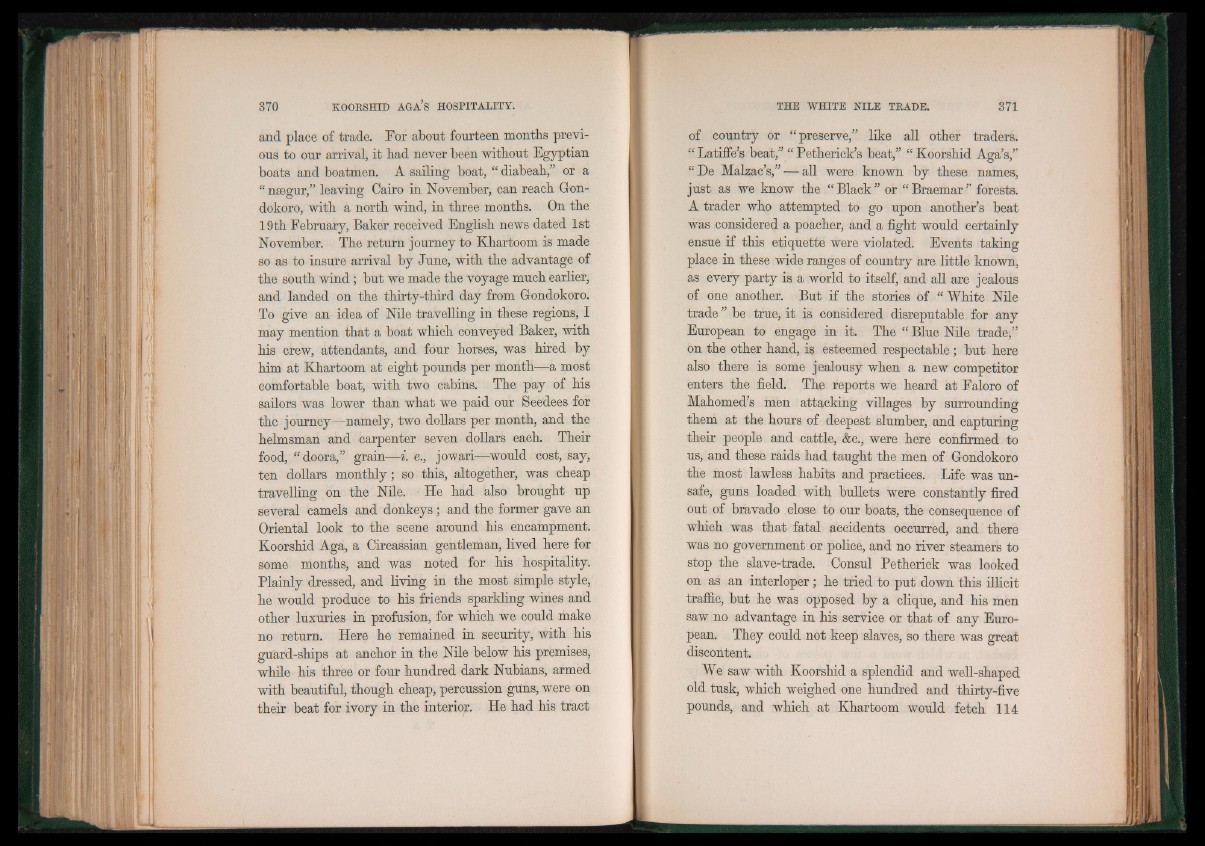
and place of trade. For about fourteen months previous
to our arrival, it bad never been without Egyptian
boats and boatmen. A sailing boat, “ diabeah,” or a
“ nsegur,” leaving Cairo in November, can reach Gondokoro,
with a north wind, in three months. On the
19th February, Baker received English news dated 1st
November. The return journey to Khartoom is made
so as to insure arrival by June, with the advantage of
the south wind; but we made the voyage much earlier,
and landed on the thirty-third day from Gondokoro.
To give an idea of Nile travelling in these regions, I
may mention that a boat which conveyed Baker, with
his crew, attendants, and four horses, was hired by
him at Khartoom at eight pounds per month—a most
comfortable boat, with two cabins. The pay of his
sailors was lower than what we paid our Seedees for
the journey—namely, two dollars per month, and the
helmsman and carpenter seven dollars each. Their
food, “ doora,” grain—i. e., jowari—would cost, say,
ten dollars monthly; so this, altogether, was cheap
travelling on the Nile. He had also brought up
several camels and donkeys; and the former gave an
Oriental look to the scene around his encampment.
Koorshid Aga, a Circassian gentleman, lived here for
some months, and was noted for his hospitality.
Plainly dressed, and living in the most simple style,
he would produce to his friends sparkling wines and
other luxuries in profusion, for which we could make
no return. Here he remained in security, with his
guard-ships at anchor in the Nile below his premises,
while his three or four hundred dark Nubians, armed
with beautiful, though cheap, percussion guns, were on
their beat for ivory in the interior. He had his tract
of country or “ preserve,” like all other traders.
“ Latiffe’s beat,” “ Petherick’s beat,” “ Koorshid Aga’s,”
“ De Malzac’s,” — all were known by these names,
just as we know the “Black” or “ Braemar” forests.
A trader who attempted to go upon another’s beat
was considered a poacher, and a fight would certainly
ensue if this etiquette were violated. Events taking
place in these wide ranges of country are little known,
as every party is a world to itself, and all are jealous
of one another. But if the stories of “White Nile
trade ” be true, it is considered disreputable for any
European to engage in it. The “ Blue Nile trade,”
on the other hand, is esteemed respectable; but here
also there is some jealousy when a new competitor
enters the field. The reports we heard at Faloro of
Mahomed’s men attacking villages by surrounding
them at the hours of deepest slumber, and capturing
their people and cattle, &c., were here confirmed to
us, and these raids had taught the men of Gondokoro
the most lawless habits and practices. Life was unsafe,
guns loaded with bullets were constantly fired
out of bravado close to our boats, the consequence of
which was that fatal accidents occurred, and there
was no government or police, and no river steamers to
stop the slave-trade. Consul Petherick was looked
on as an interloper; he tried to put down this illicit
traffic, but he was opposed by a clique, and his men
saw no advantage in his service or that of any European.
They could not keep slaves, so there was great
discontent.
We saw with Koorshid a splendid and well-shaped
old tusk, which weighed one hundred and thirty-five
pounds, and which at Khartoom would fetch 114